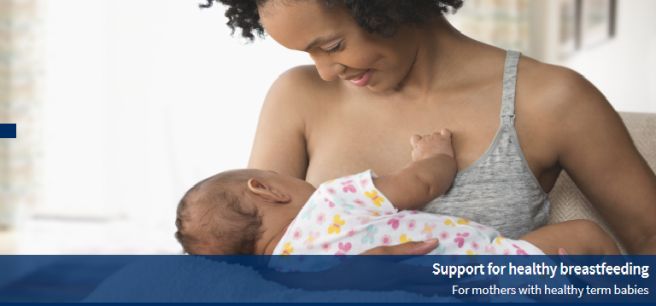The Cochrane Database of Systematic Reviews has published two reports on breastfeeding.
‘Support for healthy breastfeeding mothers with healthy term babies’

There is extensive evidence of important health risks for infants and mothers related to not breastfeeding. In 2003, the World Health Organization recommended that infants be breastfed exclusively until six months of age, with breastfeeding continuing as an important part of the infant’s diet until at least two years of age. However, current breastfeeding rates in many countries do not reflect this recommendation.
The authors concluded that when breastfeeding support is offered to women, the duration and exclusivity of breastfeeding is increased. Characteristics of effective support include: that it is offered as standard by trained personnel during antenatal or postnatal care, that it includes ongoing scheduled visits so that women can predict when support will be available, and that it is tailored to the setting and the needs of the population group.
Support is also likely to be more effective in settings with high initiation rate and strategies that rely mainly on face-to-face support are more likely to succeed with women practising exclusive breastfeeding.
Read more here
‘Breastfeeding education and support for women with twins or higher order multiples‘
There are rising rates of multiple births worldwide with associated higher rates of complications and more hospital care, often due to prematurity. While there is strong evidence about the risks of not breastfeeding, rates of breastfeeding in women who have given birth to more than one infant are lower than with singleton births. Breastfeeding more than one infant can be more challenging because of difficulties associated with the birth or prematurity. The extra demands on the mother of frequent suckling, coordinating the needs of more than one infant or admission to the neonatal intensive care unit can lead to delayed initiation or early cessation. Support and education about breastfeeding has been found to improve the duration of any breastfeeding for healthy term infants and their mothers, however evidence is lacking about interventions that are effective to support women with twins or higher order multiples.
The authors found no evidence from randomised controlled trials about the effectiveness of breastfeeding education and support for women with twins or higher order multiples, or the most effective way to provide education and support . There was no evidence about the best way to deliver the intervention, the timing of care, or the best person to deliver the care. There is a need for well-designed, adequately powered studies of interventions designed for women with twins or higher order multiples to find out what types of education and support are effective in helping these mothers to breastfeed their babies.
Read more here
